I feel the need to make the following clear in print and in public: I don't think that God exists. I write about God and lot and think about God a lot and use the word God a lot, but when I do so, I'm often taking advantage of the flexibility of the word and the concept. To clarify, then: I don't believe in a supernatural being who's behind all this. I'm not a deist who believes that a god created the universe and became uninvolved, and I'm certainly not a theist who thinks that there is a god who answers prayers or performs miracles or has any direct effect on our lives. I don't believe that such a thing as Yahweh from the Hebrew Scriptures exists or that Jesus is his son and died for us or that Allah is the one true god. I don't even believe in a more abstract "force" that guides us in any way. There is nothing.
I'm also pretty certain about this, so I'm not an agnostic. I only hesitate to use the other "A" word because it merely describes part of what I am -- not all that I am -- where gods are concerned. I don't believe in gods in the same way that readers of The Catcher in the Rye don't believe in Holden Caulfield. Readers, of course, take their disbelief of Holden as a given (no special term needed), since his nonexistence doesn't prevent him from being talked about, analyzed, or loved. I feel this way about mythology. I love Zeus and Christ and Ra and Krishna. They're important to the world and they're important to me and the way I think. And while I think the literalism of religion misunderstands what gods actually are, I often take issue with the dismissive way that nonbelievers treat gods as well. But, in spite of this hesitation and disclaimer, atheist is an accurate label for me. I'm an atheist. Here's my story.
As a Young Boy: Seeds of Unbelief
I was born of Christian parents: Pentecostals specifically, who eventually (when I was six) left that group and ended up at a small non-denominational church (which they still attend), a part of a larger group who call themselves, unofficially, "The Body of Christ." I'm not sure exactly how different my church was from other churches, but my friends did semi-joke with me that they always expected us to pull out the snakes. They are certainly archaic in many ways: women with long dresses and hair, no female ministers, "country-ness" being next to godliness. Their beliefs aren't always the same as "mainstream" Christianity. No trinity, first of all: bitheism for this group (though they never use that term), the belief in a father and son who are separate beings, while the holy ghost is not a "person" at all, but more of a force or spirit. Also, no belief in a literal Hell.
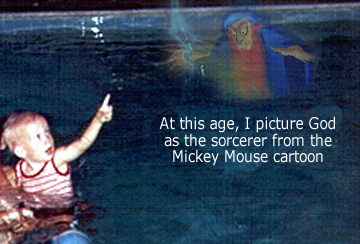 The church had already hooked me in at that young age, but two things gave me a lifeline to atheism even then. One (as much as they might hate to hear it) was my parents. Mom was born into a Baptist family and struggled during her teen years to find a church that suited her when she felt an urge for something different. When she left her family's church in favor of "spirit-filled" churches, they frowned upon it. No one disowned her or anything (she and her family were and are very close), but you can tell she was wounded at the time, and she still talks about it as a painful experience. As a result, Mom instilled in me a desire to seek the truth, no matter how unpopular or alienating. Both she and Dad have always been critical of the church they're currently in, calling it on its ridiculousness or wrongness when it often appears, and I was taught that the leaders of the church are just humans, not gods, not infallible. If and when my parents find out that I have turned from belief altogether, I hope that they'll recognize that I, too, am finding my own way to becoming a moral and spiritual person, even if it might seem as alien to them as their unusual church does to others.
The church had already hooked me in at that young age, but two things gave me a lifeline to atheism even then. One (as much as they might hate to hear it) was my parents. Mom was born into a Baptist family and struggled during her teen years to find a church that suited her when she felt an urge for something different. When she left her family's church in favor of "spirit-filled" churches, they frowned upon it. No one disowned her or anything (she and her family were and are very close), but you can tell she was wounded at the time, and she still talks about it as a painful experience. As a result, Mom instilled in me a desire to seek the truth, no matter how unpopular or alienating. Both she and Dad have always been critical of the church they're currently in, calling it on its ridiculousness or wrongness when it often appears, and I was taught that the leaders of the church are just humans, not gods, not infallible. If and when my parents find out that I have turned from belief altogether, I hope that they'll recognize that I, too, am finding my own way to becoming a moral and spiritual person, even if it might seem as alien to them as their unusual church does to others.My other lifeline to atheism was the church itself. Built into their basic belief system are a few things that I still consider positive. The ministers always teach "subject to question" (as they put it), so if someone has a concern or question while they are preaching, a member of the congregation (or another preacher) may interrupt (even women!). No sermon is ever pre-prepared (since they are "led by the spirit"), so this is always possible. Though pastors are more or less in charge, there is a distribution of power among many ministers who are often involved in healthy (I think I can call it that) debates about theological issues. Not everyone in the room believes exactly the same thing (for example, some don't believe in the Devil), and that is considered okay. The idea is that they are looking for the truth, like supernatural scientists (or at least literary critics). They call the debate the "thrashing floor," and they always claim that if someone else somewhere has a better way, they want to know about it.
It also helped that my church encourages symbolic reading of the Bible (a spiritual book, after all). A common atheist complaint is that religious people "pick and choose" when it come to what is symbolic and what isn't, what to ignore and what to put into practice. I agree with that complaint to a degree, but thank goodness most do pick and choose, else we'd all be in trouble--lots more stoning to death for disobeying parents or doing yard-work on the Sabbath, for example. Of course, in any kind of writing there are things that are symbolic and things that are not. This is just being a good reader. Even fundamentalists do not believe that the Lord is actually a shepherd and we are actually sheep. Meanwhile, it's pretty clear that those laws about stoning people were not metaphorical. At any rate, my personal Bible-reading paired with the interpretations I heard at church gave me solid lessons in critically and analytically reading literature and religious texts that I still employ.
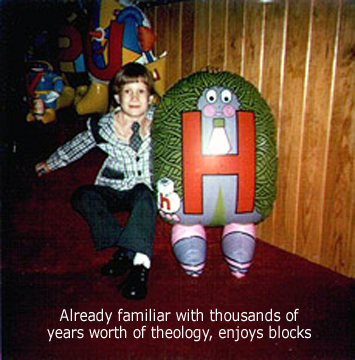 Our ministers encouraged us to read the Bible for ourselves, to not take their word for it. And I did. Reading the Bible for myself was perhaps the main thing that allowed me to become an atheist. It forces you to question everything about religious thought, or it should. You open the Bible thinking it's going to direct your life or give you answers or rules (because this is what everyone claims it does), but it does none of those things. Instead, it's this big beautiful confusing mess, and the first thing you notice, not unimportantly, is that God is a horrible person. This is who we're worshipping? Before I finished the first few chapters of Genesis, at age six or seven or however old I was, I had already concluded that the god of the Bible must not be the god I was meant to be so in love with, and so -- like everyone else -- I had to invent my own version of God, one that I could actually tolerate.
Our ministers encouraged us to read the Bible for ourselves, to not take their word for it. And I did. Reading the Bible for myself was perhaps the main thing that allowed me to become an atheist. It forces you to question everything about religious thought, or it should. You open the Bible thinking it's going to direct your life or give you answers or rules (because this is what everyone claims it does), but it does none of those things. Instead, it's this big beautiful confusing mess, and the first thing you notice, not unimportantly, is that God is a horrible person. This is who we're worshipping? Before I finished the first few chapters of Genesis, at age six or seven or however old I was, I had already concluded that the god of the Bible must not be the god I was meant to be so in love with, and so -- like everyone else -- I had to invent my own version of God, one that I could actually tolerate.I liked Jesus much better, which is the usual reaction. What I liked about him were things that planted atheistic seeds in my brain. He was smart, he was a rebel, he fought the established religious authority, he spoke symbolically, he broke all the laws, he was kind even when it was illegal to be. But even Jesus wasn't perfect. While I was able to dismiss God almost altogether as a character, I had to merely overlook Jesus from time to time to keep him around, just like you do with friends. (I had to ignore the apostle Paul a lot.)
So far, all the things that should have sucked me in to religion allowed me to have some critical distance from it: my parents, the church, the Bible, and the character of God himself. Nothing secular or irreligious had this effect on me. My best friend in elementary school was probably an atheist, and he never made me question anything, and neither did any other atheist or non-Christian I knew.
So from about the age of six (when I first really started thinking about God) to about age fifteen, I was someone who was very involved with God and church and the Bible. Those things were a big part of my life and beliefs, and I would have never thought of leaving them behind. And yet, I can see now that I had some open doors.
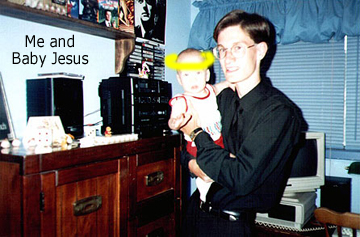 When you're little, your religious life is pretty much given to you by your parents. I had my own thoughts, of course, but even practical stuff like whether you attend church or not is decided by them. I remember, for example, that I was sad because my parents didn't go every single time (three times a week), which meant I didn't get to go every single time. I remember excitedly telling my pastor one night that I was getting my driver's license soon and would be able to come to church on my own, whether my parents came or not.
When you're little, your religious life is pretty much given to you by your parents. I had my own thoughts, of course, but even practical stuff like whether you attend church or not is decided by them. I remember, for example, that I was sad because my parents didn't go every single time (three times a week), which meant I didn't get to go every single time. I remember excitedly telling my pastor one night that I was getting my driver's license soon and would be able to come to church on my own, whether my parents came or not.And I did utilize that driver's license, but eventually the full power of autonomy kicked in, and I started to realize why Mom and Dad sometimes just didn't want to pull themselves off the comfy seats, dress themselves, and sit on a pew for two to three hours. I also noticed, of course, that being mobile with friends is often more interesting than singin' and preachin'. So it happened once that I didn't go to church for -- get this -- three whole months!
Now, if I had simply let those three months turn into four months, then five, then one year, then five years, then ten... if I had continued to believe in God but only go to church every once in a blue moon, then I probably would have just become a normal, secular, God-believing-in Christian. Or maybe I would have become an atheist. I'm not sure. But I probably wouldn't be sitting here writing this. In other words, I probably wouldn't be the freak I am today when it comes to God. But, instead, I had a religious re-awakening.
My re-awakening didn't come in the form of a revival or revelation. I wasn't knocked blind off a horse. I was brought back to God through the power of Andrew Lloyd Webber's musical Jesus Christ Superstar.
That's right: the 1970 rock opera that was originally considered rather blasphemous for not necessarily depicting Jesus as the actual son of God (no resurrection, for example), for taking the (sympathetic) point of view of Judas, for being hip and ironic about the story, and of course for totally rocking. So, while belief-based stuff was partially responsible for my eventual atheism, it was this secular and slightly anti-religious work that put me back on a stricter religious path.
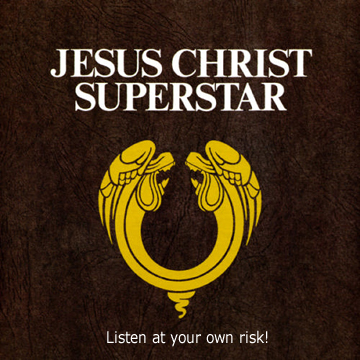 It's still my favorite Webber musical (and let's not forget lyricist Tim Rice, who is really more to blame). Through it, I experienced Jesus in a way I hadn't before. In addition to the attractive musical and lyrical presentation, the ideas explored were very appealing to me, primarily being based on reasonable questions and doubt. After my initial Bible read-through as a young kid, I didn't really pick it up that much, but this made me want to read the gospels again, so I did. As a young man, I re-discovered Jesus as a person and liked him even more than I was able to as a kid. (Reading the Bible as a very young person almost doesn't count. It's not exactly a book for children.) Around this time is when I realized I had skipped those long three months, which I initially agonized over and apologized for (to God and my church). These days, I can barely manage to put my socks away within a three month period, but back then it seemed like a very long time, so I started doing double-duty for God.
It's still my favorite Webber musical (and let's not forget lyricist Tim Rice, who is really more to blame). Through it, I experienced Jesus in a way I hadn't before. In addition to the attractive musical and lyrical presentation, the ideas explored were very appealing to me, primarily being based on reasonable questions and doubt. After my initial Bible read-through as a young kid, I didn't really pick it up that much, but this made me want to read the gospels again, so I did. As a young man, I re-discovered Jesus as a person and liked him even more than I was able to as a kid. (Reading the Bible as a very young person almost doesn't count. It's not exactly a book for children.) Around this time is when I realized I had skipped those long three months, which I initially agonized over and apologized for (to God and my church). These days, I can barely manage to put my socks away within a three month period, but back then it seemed like a very long time, so I started doing double-duty for God.If a rock opera wasn't a weird enough thing to get me into Jesus again, then the other thing is arguably weirder. I got into Eastern religion, specifically Taoism. I was studying it in high school English class and it made a lot of sense to me. We are all part of the Tao, so if we go with the natural flow of the universe and don't fight it, everything is beautiful. I figured out that Jesus was a Taoist (something I more or less still think), and so was I. I don't know if I ever called myself a Christian Taoist, but that's pretty much what I was.
Combine this with a church that taught that "perfection" was possible (essentially becoming like Jesus, overcoming sin), that you could bypass the sting of death, that you would meet God and Jesus and -- with them -- change the world (which would never end) forever. Combine that with the ironic distance that I maintained with the world at large, and you've got a seventeen-year-old Rusty Spell who walked around feeling that he was yet another son of God, happy as all get-out, living in a world that he was going to run one day, death nowhere in sight, the universe flowing inside him, and the hippest music going through his head. Wind would blow from excitement when I was around. Who wouldn't want this?
Going to college and being on my own gave me another reboot. I retained some of the feelings I just described, but I also felt that I needed to be careful not to screw things up with too much looseness. So my emphasis became what might be called dharma (or duty), but it was a Christian-flavored version of that concept, as well as a personal one that in my case more or less amounted to being a really good college student and scholar, with a secondary emphasis on staying healthy.
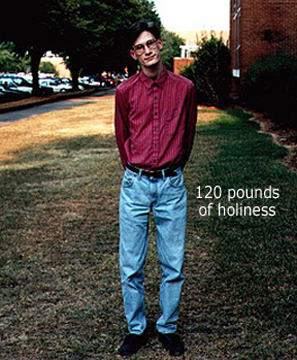 I thought, for example, that waking up happily at seven o'clock, eating a big breakfast every morning (with orange juice and milk), reveling in early 8:00 am college classes, making perfect scores in all of those classes, eating a healthy lunch (with milk) and a healthy dinner (with milk and my one allowed Coke of the day), and going to bed at the same time every night was making me a better person. Asceticism Lite: College Edition. I remember denying myself scratches when I itched because I thought it built spiritual character and denied the flesh. I was proud of myself for abstaining from sexual acts. I felt most comfortable with my top button buttoned. When I felt I might get sick, I drank extra orange juice and willed that I would stay well, and it worked. I have to admit that I enjoyed myself, and I do look back on the time fondly.
I thought, for example, that waking up happily at seven o'clock, eating a big breakfast every morning (with orange juice and milk), reveling in early 8:00 am college classes, making perfect scores in all of those classes, eating a healthy lunch (with milk) and a healthy dinner (with milk and my one allowed Coke of the day), and going to bed at the same time every night was making me a better person. Asceticism Lite: College Edition. I remember denying myself scratches when I itched because I thought it built spiritual character and denied the flesh. I was proud of myself for abstaining from sexual acts. I felt most comfortable with my top button buttoned. When I felt I might get sick, I drank extra orange juice and willed that I would stay well, and it worked. I have to admit that I enjoyed myself, and I do look back on the time fondly.I see now that what I did wasn't exactly unusual and that most of my behavior was something only I would have noticed at the time. I wasn't too far from living the kind of ordered life that Ben Franklin described in his diary. I doubt I came across as especially weird to anyone (any more than I usually did). I didn't throw everything out that didn't fit on a schedule or point to perfection or self-denial. I hung out with friends a lot. I danced a lot. I was a glutton for knowledge in a way that went beyond merely doing well in classes. I had loads of fun. I even had girlfriends, who helped me ease up at least a little bit (though not enough) on the whole abstaining thing.
Girls are worth mentioning. I can see why women are bad news for those who want to be holy men. They force you out of your monkish existence and knock some real and necessary life into you. One of the regrets I now have is my putting religion before relationships and feeling guilty when I didn't. Those overwhelming sensations and emotions that human love provided were stronger than anything the holy spirit could give me, as blasphemous as it felt to think it. It made me feel that I was cheating on God.
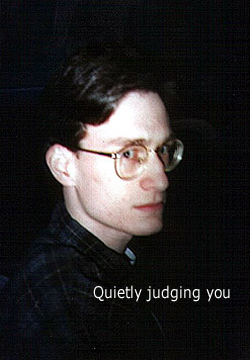 As those college days went on and I went to graduate school, noble dharma slipped into lazy dogma. It's still difficult to say exactly how it happened, how my groovy religious hybrid morphed into a minor version of the kind of bitter Christian you sometimes see on television. But I think it went something like this: my new sense of duty made me more disciplined, less loose, and I decided to get truly serious, to go after what God wanted for me -- not what was best for me -- and so I had to find out who God really was. This made me pay more attention to church, since I thought they had the answers (forgetting, apparently, the critical principles my mother gave me). And their answer was that God was Yahweh (like him or not), Jesus was his son, and there was a big laundry list of theology to follow that I had happily ignored before. Forget the Tao or my own creativity or love or passion. Just follow their interpretation of this one book. So I sat dutifully in the pew and learned what I had to do to get into Heaven or make the Bride of Christ or whatever the hell it was I thought I wanted. My focus shifted to rulebook Christianity, the legalism that I now hate so much.
As those college days went on and I went to graduate school, noble dharma slipped into lazy dogma. It's still difficult to say exactly how it happened, how my groovy religious hybrid morphed into a minor version of the kind of bitter Christian you sometimes see on television. But I think it went something like this: my new sense of duty made me more disciplined, less loose, and I decided to get truly serious, to go after what God wanted for me -- not what was best for me -- and so I had to find out who God really was. This made me pay more attention to church, since I thought they had the answers (forgetting, apparently, the critical principles my mother gave me). And their answer was that God was Yahweh (like him or not), Jesus was his son, and there was a big laundry list of theology to follow that I had happily ignored before. Forget the Tao or my own creativity or love or passion. Just follow their interpretation of this one book. So I sat dutifully in the pew and learned what I had to do to get into Heaven or make the Bride of Christ or whatever the hell it was I thought I wanted. My focus shifted to rulebook Christianity, the legalism that I now hate so much.This is the best I can describe it, but it's just as well to say that I went a little crazy.
I would have never, before this point, felt comfortable describing myself as "Christian," but the label sure fit me now. I had most of the same kind of hates that one associates with Christianity. (Notice that Christianity is not much associated with love, except in theory.) I believed all the strict policies about getting on God's good side. I probably didn't make life too much of a hell for others (since I was more of a brooder than an outspoken zealot, and I usually only brought these things up in front of other Christians), but I wouldn't be terribly surprised if I did. When I look back at myself during these "slipping into contemporary Christianity" years (luckily, only two or three), it as if I'm looking at a different person, or at least a different brain. This was rock bottom.
What put me back on the path to atheism was not "losing faith." That kind of thing only tends to strengthen one's relationship with God. ("When I lost a leg, I screamed at God and hated him, but eventually I saw that he had a plan for me" or some similar narrative.) No, what happened was that I became more and more interested in God.
My church used to talk about a "wheel within the wheel," the idea that the church was this big spinning thing that had an outer rim (fun, but you could easily get thrown off) and an inner circle: almost like a secret society that ran everything. When I was on the fringes, the wheel was wild and mysterious. The closer I moved (wobbling) toward the center -- the closer I got to youth ministers, pastors, pastors of pastors, and all the people truly in charge -- the more I saw how it all operated. But there was nothing there of any substance, just mechanizations. A heart of darkness. Being in the "wheel within the wheel" was like seeing the man behind the curtain, except that this wizard was fooling himself rather than fooling others, and he certainly didn't realize that all of these gifts he supposedly could give from his black bag were actually inside us all along.
A significant moment in my life was sitting in church one regular ol' night listening to a preacher preach. I'd been at this church for almost twenty years by this point, and I figured I'd heard everything there was to hear. To attempt to prove that this was true, I took out a sheet of paper and wrote down everything that the preacher said that I'd heard before: not only that I'd heard a few times before, but that I'd heard thousands of times (sometimes literally). I filled up the sheet in under a minute. I felt like a pupil who had to keep repeating a grade--not because he failed, but because he was the star student.
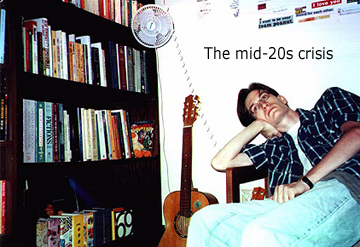 I felt nothing at church now, and I studied those around me who seemed to be feeling things to see what was causing those feelings, figuring that it just might not be God after all--only some inner desire that needed a name. Never in my life did I understand the concept of prayer fully, but I did pray, at least in the hopes that it would change my own mind, if not God's. But now prayer felt entirely useless. I stood up and testified in church once to tell everyone what I observed about our group: that we get emotional and cry in our services when we probably don't in other public life. I told the congregation that church was acting as a kind of psychotherapy: you go in once or twice a week and let it all out. I probably tried my best to give credit to God for being able to fix our psyches during these sessions, but in my head I realized that it would be just as well to have a good cry, especially in a community setting where it was permissible, like "Jack" going to support groups in Fight Club. The "God" umbrella allowed you to do things you wouldn't normally do -- such as dance with other men and sob and shout and speak of a higher meaning in the universe with interested parties -- but this made God an excuse for this behavior, not a reality. And, of course, church was often the therapy for the psychological problem that it itself caused.
I felt nothing at church now, and I studied those around me who seemed to be feeling things to see what was causing those feelings, figuring that it just might not be God after all--only some inner desire that needed a name. Never in my life did I understand the concept of prayer fully, but I did pray, at least in the hopes that it would change my own mind, if not God's. But now prayer felt entirely useless. I stood up and testified in church once to tell everyone what I observed about our group: that we get emotional and cry in our services when we probably don't in other public life. I told the congregation that church was acting as a kind of psychotherapy: you go in once or twice a week and let it all out. I probably tried my best to give credit to God for being able to fix our psyches during these sessions, but in my head I realized that it would be just as well to have a good cry, especially in a community setting where it was permissible, like "Jack" going to support groups in Fight Club. The "God" umbrella allowed you to do things you wouldn't normally do -- such as dance with other men and sob and shout and speak of a higher meaning in the universe with interested parties -- but this made God an excuse for this behavior, not a reality. And, of course, church was often the therapy for the psychological problem that it itself caused.I hadn't gotten this far in my thoughts yet, but I was getting there: thoughts that would have once felt dangerous to me. The church and religion at large had all kinds of clever ways to prevent me from thinking for myself for many years, but they started seeming less clever after a few decades. For example, if I were in a spiritual lull like the one I described above, where I felt nothing, it could be (a) a devil warping my mind, (b) God testing me to see if I'd stay faithful even when he wasn't with me, like he did with Job, (c) my liberal college education teaching me non-Godly ways to think, or (d) whatever pseudo-logic fit the moment. Though mostly it was A and B. I may have become an atheist sooner if I didn't believe in devils (and I did, for the record), since they're such a handy excuse. Of course I would feel these things if a devil had gotten a hold of my mind. The very thoughts I was having would be proof of a spiritual realm -- a battling of good and evil -- and of course of God himself!
My church used to say of themselves, when they were accused of being just as organized as "organized religion," that "The Body of Christ isn't an organization; it's an organism." Oh! Those kinds of phrases went a long way for a gullible guy like me in deflecting criticism. Another Christian group might say "It's not a religion; it's a relationship." Same thing. For those of you who weren't born into this, I must sound like an imbecile to have the most important actions of my life controlled by catch phrases, but it happens all the time to people even smarter than me. "Jesus is fully god and fully human." We have a phrase for it, so no need to question it further. (If you need a more science-y term, then call it the Hypostatic Union.) "God works in mysterious ways." "Everything happens for a reason." "We'll know the answers in the by and by." You can probably provide many more.
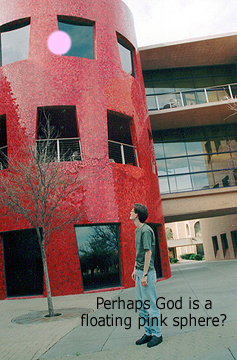 I also started realizing that those hates that bind many (though, happily, not all) Christians together were no longer tolerable by me. How long could I be content to listen to bullshit ideas about homosexuality, abstinence, abortion, and the rest of it? How could I abide a religion that sided with the worst kinds of politics? Where man being the "head of the woman" was the rule? That seemed to care the least about humanity in general? Whenever there is positive change in the world, religion is always the last to catch up (if they ever do): equal rights, feminism, evolution, stem cell research, abolition of slavery, the knowledge that the earth revolves around the sun... you name it. These issues were not the main reasons for my disenchantment (though maybe they should have been), but they did help me open my eyes to the mechanism at work.
I also started realizing that those hates that bind many (though, happily, not all) Christians together were no longer tolerable by me. How long could I be content to listen to bullshit ideas about homosexuality, abstinence, abortion, and the rest of it? How could I abide a religion that sided with the worst kinds of politics? Where man being the "head of the woman" was the rule? That seemed to care the least about humanity in general? Whenever there is positive change in the world, religion is always the last to catch up (if they ever do): equal rights, feminism, evolution, stem cell research, abolition of slavery, the knowledge that the earth revolves around the sun... you name it. These issues were not the main reasons for my disenchantment (though maybe they should have been), but they did help me open my eyes to the mechanism at work.I had all but completely lost interest in my local church (except for being friends with the people, who I will love forever) when I finished graduate school at age twenty-seven (a ripe old age) and got a job in another state. One of "our kinds" of churches (part of the "organism") happened to be near where I began working, and I attended. By now, I was going to church for reasons that had little to do with God and nothing to do with personal satisfaction. But I felt maybe I could help other people. The church needed a drummer, so I drummed and gave lessons. At least I could provide and teach music, always a good thing. I helped to make sure the choruses on the overhead projector were grammatically correct. I filled in on piano some nights. Eventually it felt like I was doing volunteer work for a group that I had no interest in promoting, so I finally stopped going, and -- with the exception of "just visiting" -- I haven't attended any church since.
By this point, some might be thinking that I just needed (or need) to find another group. "You need to find a church that's more politically progressive" or "We're not all like that" or "You should read this book that explains things" or "That's why Islam is the answer" or any number of things. First, I have experienced other groups, and they all seem the same to me at the core. I don't see, finally, much essential difference between the Pope, the New York rabbi, the country preacher, the small town imam, or the progressive minister with hip tattoos on his arms. Second, and more importantly, here's an analogy:
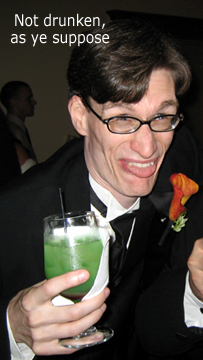 I'm not a drinker. I never was. I realize most people are. When a drinker encounters a non-drinker like me, they always say the same thing (after asking "Why not?"): "You should try this drink. You can barely taste the alcohol. It tastes like candy." (Or some variation.) But my answer is this: I'm better off not drinking at all. Why would I want to drink if the alcohol has little effect? (If you're following my analogy, you'll immediately think of "watered-down" religion.) Why not just drink a candy-tasting drink if that's what I want? (I also recommend real rock music over Christian rock for this reason.) Drinking is expensive. It's time-consuming. It can ruin your life if you're not careful. Sure, it might relax you for a while or make ugly girls more attractive, but it can also make you sick or can kill you or can alienate you from your family or trick you into sleeping with ugly girls. What, in the end, is the goddamned point of starting if you haven't already? And why would an alcoholic (like me, religiously) who had finally kicked the habit want to start again on another kind of booze? "Well, your problem is that you were drinking vodka. But have you tried beer?" So I realize that the majority of people in the world enjoy the intoxication of religion, and I know that no one likes to drink alone, but the final step in AA (Atheists and Agnostics) is to realize that there is no Higher Power.
I'm not a drinker. I never was. I realize most people are. When a drinker encounters a non-drinker like me, they always say the same thing (after asking "Why not?"): "You should try this drink. You can barely taste the alcohol. It tastes like candy." (Or some variation.) But my answer is this: I'm better off not drinking at all. Why would I want to drink if the alcohol has little effect? (If you're following my analogy, you'll immediately think of "watered-down" religion.) Why not just drink a candy-tasting drink if that's what I want? (I also recommend real rock music over Christian rock for this reason.) Drinking is expensive. It's time-consuming. It can ruin your life if you're not careful. Sure, it might relax you for a while or make ugly girls more attractive, but it can also make you sick or can kill you or can alienate you from your family or trick you into sleeping with ugly girls. What, in the end, is the goddamned point of starting if you haven't already? And why would an alcoholic (like me, religiously) who had finally kicked the habit want to start again on another kind of booze? "Well, your problem is that you were drinking vodka. But have you tried beer?" So I realize that the majority of people in the world enjoy the intoxication of religion, and I know that no one likes to drink alone, but the final step in AA (Atheists and Agnostics) is to realize that there is no Higher Power.Ayaan Hirsi Ali wrote a beautiful essay called "How (And Why) I Became an Infidel" about how she was able to leave Islam. After she did so, many Christians suggested that she join them, since they felt their religion was less "radical" than Islam (which of course is debatable). Her answer was the same as mine. If you're finally free of bondage, would you rather put on another set of less-heavy shackles or keep the shackles off altogether?
Besides, I find that when people describe religions as being "radical," what they really mean is that the followers actually practice what they preach. For example, not too many "mainstream" Christians approve of Fred Phelps, the "God Hates Fags" guy, but many quietly preach the same hateful belief (while thinking that phrases like "Love the sinner, hate the sin" makes them tolerant), so what's the difference? The mainstream guys are the ones making and influencing all the hate-based laws, not the nuts. The problem, I'm afraid, is in the core of the religion itself.
And to be "liberal" or "progressive" religiously is simply to be more secular, to ignore God (or explain away that he didn't mean it in the first place) when he asks you to hate homosexuality or oppress women or kill the infidels. They will tell you that the "extremists" are perverting or misapplying the Bible or the Koran, but it seems to me that they are more closely (not always fully, thank goodness) following these holy books. The religious people I like best are the ones who ignore God most, the ones who favor actual morality over supposed divine command, the ones who place love at the center of belief, but in their case it seems that God isn't necessary for their social, political, and moral projects. In fact, he's an obstacle. This is why I eventually dumped God entirely.
Was I sad when I finally broke up with God? As you know, breakups can be painful even if the person you're breaking up with wasn't the person you thought he was. No, I wasn't sad. As Charles Darwin put it concerning his own slip into disbelief, "The rate was so slow that I felt no distress." That was me: no sudden movements. No restless nights sorting things out. I was twenty-seven when I stopped going to church, but I still more or less believed in God then. I even made a gospel album around that time, which I now call "my last hoo-rah," since listening to this album today feels like me saying goodbye. Three years later (I've had to look up old documents to figure out any sort of timeline), age thirty, I wrote somewhere that the only reason I believed in God was because Johnny Cash and the Beatles did (though, for the latter, I doubt they believed in a literal god). Two years after that, thirty-two, I was only mildly upset at how only mildly upset I was when I read Christopher Hitchens's god Is Not Great and realized I didn't disagree with any of its basics. One year after that, by the time I'd gotten my second job and moved to another state again at the age of thirty-three (the age Jesus was when he died), I admitted to myself that I was an atheist.
 If you're doing the math, that's six years after halting church attendance. Add the four years that it took me to go from "rock bottom Christianity" (age twenty-three) to quitting church, and you've got about a decade's worth of a very slow realization: about a third of my life to that point. Because of the hold religion has on the mind, that seems about right. In fact, and not to brag, I may have been a quick study.
If you're doing the math, that's six years after halting church attendance. Add the four years that it took me to go from "rock bottom Christianity" (age twenty-three) to quitting church, and you've got about a decade's worth of a very slow realization: about a third of my life to that point. Because of the hold religion has on the mind, that seems about right. In fact, and not to brag, I may have been a quick study.So I wasn't sad about losing my religion. The only thing I was sad about was that I had been under this needless burden for so long. I had carried around guilt for no reason, I wasted my energies on things that didn't exist, I missed out on many of the simple (and not so simple) pleasures of my youth and of a fully secular life, and more. But I was thrilled to be free.
As many couples declare once the day comes, "We actually broke up a long time ago. We just finally made it official." Though some religious people seem to be able to carry on the romance their entire lives, the "relationship" of many seems to be a sad one: half-believing their own dogma, never feeling one drop of spirituality or joy, praying out of duty every night, hopping from church to church to find the god that works for them, or sitting in the same church just because they've always done it and can't imagine anything else... There's a certain contentment in that state even, the comfort of a mundane marriage. But, oh, the joy of divorce!
Throughout Life: Revelations
Though I've been presenting these events as a chronological narrative, what was going on inside me was not necessarily linear. Also, it may seem at this point that I haven't provided strong reasons for turning to atheism, only something of a moody spiritual autobiography, so here are a few of the major reasons and realizations from throughout my life (not comprehensive and not intended to convince anyone else, since this writing is not an argument for atheism).
One of the things I realized was that I was only a Christian (and a specific kind, at that) because that's what I was born into. I may have flirted a little with others, but I kept being pulled back to the core of what was finally a geographical fact. I realized that if I had been born in Iraq, I would have been a Muslim. If I had been born in India, I would have been a Hindu. If I had been born in Babylon in 2000 BCE, I would have worshipped the storm god Marduk. (I was also born in a country that allows freedom of religion, including atheism, so there's that also.)
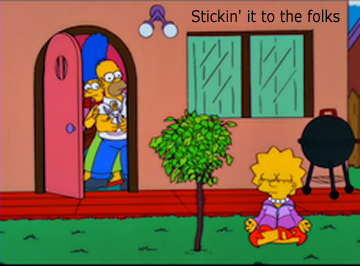 People do not always, of course, follow the dominant religion of their birthplace. In a silly episode of The Simpsons, Lisa Simpson -- like all good "free-thinking" liberals -- decides to rebel and switch to a religion that's not her parents'. As she puts it: "I want to pick a religion that's right for me," as if religions are varieties of iPods, eventually screaming out of her window, "I'm Buddhist!" (what else?). This, to me, seems like the kind of booze-switching I mentioned above. It is fine, of course, to abandon a religion you don't like in favor of a preferable one, but might it be even better to abandon the entire enterprise?
People do not always, of course, follow the dominant religion of their birthplace. In a silly episode of The Simpsons, Lisa Simpson -- like all good "free-thinking" liberals -- decides to rebel and switch to a religion that's not her parents'. As she puts it: "I want to pick a religion that's right for me," as if religions are varieties of iPods, eventually screaming out of her window, "I'm Buddhist!" (what else?). This, to me, seems like the kind of booze-switching I mentioned above. It is fine, of course, to abandon a religion you don't like in favor of a preferable one, but might it be even better to abandon the entire enterprise?Not only did I have the geographical realization (which I had at a very young age, though it took a long time to truly sink in), but I had been studying (privately, mostly) other religions and mythologies and of course realized basic facts: much of the Bible (including God himself) is just a rewrite of earlier stories and ideas from the Near East, the Jesus death and resurrection story is a common mythological motif, all the creation stories seem just as "true" if you read them metaphorically, etc. When I teach Gilgamesh, which is older than Genesis, and students read a flood story that is nearly identical to Noah's, some tell me that it makes them question everything they've ever believed. Yes, it is bound to.
As a result of my own questioning, my initial conclusion was that all religions were "correct," that everything is just a symbol of God. Bowing to Mecca is just as correct as saying the Lord's prayer. Heracles and Jesus are cut from the same symbolic cloth. These are all paths and images that lead to the same place. God exists, and these images are how he manifests himself locally. I decided to stick with the Christian images not because they were more true than any others, but because they were the ones I knew best. If I wanted to throw in other images, prayers, gods, or whatever, then it all amounted to the same thing.
This kind of thinking led me to the next realization, which is that God himself is a symbol. This is really a final step. Once you've made it to this thought, you may be all kinds of things, but you're certainly an atheist. God doesn't actually exist. Gods don't exist. Yahweh, Krishna, Marduk, Zeus: the lot of them don't exist, except as symbols and psychological projections. Of what? Well, of nature, emotions, love, intellect, concepts of good and evil. Everything really, though especially those things that cannot be named. As the Tao Te Ching says, "If you can talk about the Tao, then you're not talking about the Tao." What a far cry from a specific creator god who made humans and gave them laws, who was born as an actual man two thousand years ago in the very real town of Bethlehem, who you have to believe in so that you can have an afterlife in the sky. When I think of it this way, I'm almost surprised that anyone (including myself) who has stepped even one inch from their local god as reported in their specific book is not sent spiraling toward atheism. It's such a seemingly inevitable path.
When I stood back and recognized gods (and angels and demons and djinns and the rest of them) as symbols and psychological projections of our wants and fears, everything made perfect sense. We know that when we dream at night the characters and images and events are elements of our own psyches, even if they're based on real people and events (as religion sometimes is). We wake up and we're often better for having the dream, but we don't imagine that it was reality and we don't insist this reality upon everyone around us. Myths are collective dreams, and we're better societies for having them, but to insist that they're real (in the same way that waking-life is real) is a delusion. And the followers of those who insist are not so much delusional themselves as they are sane people following someone else's delusion. To be religious is to believe that someone else's dream is true.
So my view is a simple one. Humans (usually artists) dream dreams (not necessarily in their sleep), big ones, and they become myth, and these myths are initially wonderful and provide deep insight into what makes us who we are. Sometimes these myths are simple (and useful) personifications, like giving human characteristics to the weather or emotions or heavenly bodies. Sometimes they are stories or images that resonate deeply, poetic ways of describing the observable world. Then "priests" (I'm using the term generally to refer to any religious middle-man) come along and treat the myths as reality, suck their magic dry, create dogma, and make sure that you're worshipping their local or preferred version of God, often employing oppression and murder and war to do so--until, of course, that kind of force isn't necessary anymore since submission to that god has already been beaten into generations of your ancestors, so that it feels that you're worshipping this local god out of love and choice (believing the other gods don't exist) when, really, you can't much help it (not without a mental struggle), and you, too, become part of the force keeping this particular god in power, reacting violently within yourself (and sometimes, too often, not only within) when your god is threatened or questioned.
A rather harsh view, but there it is. They say one can't prove that God doesn't exist (slippery as he is), but I see the above pattern happening over and over and over, since the beginning of civilization. Seems like evidence to me.
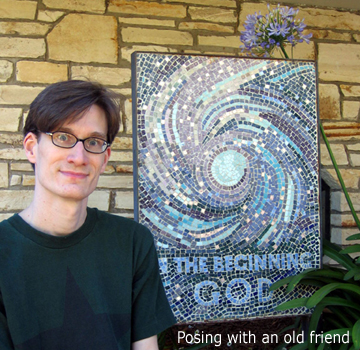 So I, too, once felt that I was worshipping God out of love and choice, but I wasn't. Recognizing that I wasn't actually loving and feeling God -- contrary to what I was told -- was one of the hardest things for me to do. My supposed feelings for him kept me faithful long after everything else had dissolved. These feelings, I think, are what people mean when they talk about "faith." (Though some don't seem to mean anything at all when they use that word.) The line of talk goes like this: God may be invisible, illogical, nonsensical, and the rest of it, but none of that matters because you can feel him in your heart and so he has to be real. Maybe it's a feeling that your life is following a guided path, or that your prayers are being answered, or maybe it's a warm or excited feeling when you think of him, or a charismatic feeling that causes shouting and other tongues, or a comfort when you're lonely or desperate, or maybe it's a "peace that surpasses all understanding." But I eventually had to admit that all of these were "feelings, nothing more than feelings."
So I, too, once felt that I was worshipping God out of love and choice, but I wasn't. Recognizing that I wasn't actually loving and feeling God -- contrary to what I was told -- was one of the hardest things for me to do. My supposed feelings for him kept me faithful long after everything else had dissolved. These feelings, I think, are what people mean when they talk about "faith." (Though some don't seem to mean anything at all when they use that word.) The line of talk goes like this: God may be invisible, illogical, nonsensical, and the rest of it, but none of that matters because you can feel him in your heart and so he has to be real. Maybe it's a feeling that your life is following a guided path, or that your prayers are being answered, or maybe it's a warm or excited feeling when you think of him, or a charismatic feeling that causes shouting and other tongues, or a comfort when you're lonely or desperate, or maybe it's a "peace that surpasses all understanding." But I eventually had to admit that all of these were "feelings, nothing more than feelings."We feel love, but that doesn't prove that the love god Eros (aka Cupid) exists. He shoots us with his arrows and we fall madly and deeply, even if it's with someone who is bad for us. We can't help ourselves. Eventually the poison wears off and we wonder what hit us. How else can you explain this phenomenon except through the existence of Eros? This is the same argument made about any god or supernatural entity. "My God is real 'cause I can feel him in my soul" makes a great gospel song but an unsound logical position. I only believed certain feelings were associated with God because -- once again -- I was told they were. Feelings of happiness, guilt, fear, ecstasy, the numinous... you name it: no matter the actual source of the sensation, it got blamed on God.
Although earlier I said that I got to a point where I no longer felt God, it is more correct to say that I realized that my God-feelings were actually other things. It's like when sickness was thought to be evil spirits or bad humors. When we found out that those things don't exist, the sickness didn't go away, but we learned (in many cases anyway) what was actually causing the sickness and sick feelings. Exorcism and bloodletting seldom managed to heal anyone, but penicillin and polio vaccines did. Reality did. Whether you have explanations for what you feel or you don't, the gods hypothesis is no longer necessary.
As a bonus, once God is eliminated, many of the negative feelings vanish along with him. I could easily love God, but when I was told I was meant to worship him, I had problems. I may be confusing the word worship with the word fawning, but that's what it felt like to me when I was forced to do it: to raise hands in church and declare that I was lowly, to loudly pray and tell God how powerful he was, to grovel on my knees and beg forgiveness when I did something "wrong" (which, nine times out of ten, wasn't wrong anyway), etc. "King" is an appropriate title for a god who needs this kind of worship, because I felt like some medieval peasant in the presence of his lord (also an appropriate title), which is precisely how I was told I was supposed to feel. So the need for worship (or the ability to do so) was something I never had, which eventually helped me to let go, even as the other supposed God feelings held on.
I once thought that atheists were simply people who didn't have the proper "feelers," that God didn't or couldn't penetrate their stubborn membranes. When I watch discussions and debates between atheists and believers today, I see a mix of pity and smugness in the faces of the believers, because they seem to be thinking what I once thought: "We can talk and debate and argue all day long, but in the end I win because your logic can't compete with my deep-down sensations. No matter what you say, I simply know and feel that God is real. I can only hope that one day he allows you into the world that he has awakened in me."
But the true awakening for me came when I realized that it wasn't God I was feeling all these years, but reality in all its wonderful forms. The universe was open to me now, not closed off and explained away by a rather limited and old-fashioned supernatural being. When I felt, I felt (as far as I could manage anyway) the real world in all its complexity and grandeur and mystery: things explained and things not yet explained. Any deity who would dare to attempt to take credit for what I feel now that I'm free from his bonds is nothing but a pitiful laughingstock.
I primarily blame myself for coming to the above conclusions (un-original as they are), but I also realize that I don't live in a vacuum and that the spirit of the past decade and of the so-called New Atheists probably had an effect on me, even before I read them. I also kept being hit with the annoying fact that many of my favorite people were outspoken atheists -- including Douglas Adams, George Carlin, Sigmund Freud, Bill Maher, and Kurt Vonnegut -- which no doubt made me think twice. No one caused me to be an atheist, but these voices allowed me to be. And though I don't blame books for converting me, there were a few authors who helped me realize that I was more or less converted already: I just had to realize it and get past my crippling dependency of my belief in God.
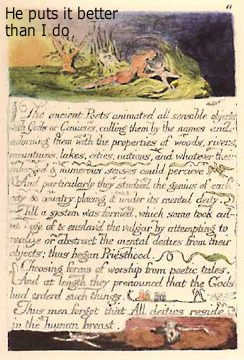 A big one was William Blake. I used to think of him as a religious writer, a "believer," simply because he's always writing about God, using the Bible for inspiration and imagery, etc. (Maybe some feel the same way about me.) But when I finally read The Marriage of Heaven and Hell, what he wrote there felt undeniable, that "all deities reside in the human breast." In one tiny illuminated page, Blake manages to lay out the history of religion I described above (the priests "choosing forms of worship from poetic tales"). Reading Blake is a loosening of chains, a soaring with the eagles. Someone like William Blake is difficult to label an atheist, since he's one of the most godly writers I know, and yet he is one: but so unlike the grumpy and sarcastic stereotype.
A big one was William Blake. I used to think of him as a religious writer, a "believer," simply because he's always writing about God, using the Bible for inspiration and imagery, etc. (Maybe some feel the same way about me.) But when I finally read The Marriage of Heaven and Hell, what he wrote there felt undeniable, that "all deities reside in the human breast." In one tiny illuminated page, Blake manages to lay out the history of religion I described above (the priests "choosing forms of worship from poetic tales"). Reading Blake is a loosening of chains, a soaring with the eagles. Someone like William Blake is difficult to label an atheist, since he's one of the most godly writers I know, and yet he is one: but so unlike the grumpy and sarcastic stereotype.Joseph Campbell is another important author for me. After watching his Power of Myth interviews with Bill Moyers, the first book of his I read was Thou Art That, which posthumously compiled his thoughts concerning Christianity. This book helped me to understand how one can love and understand myth, live by it in some sense, and yet not "believe" it in any literal, historical way. I needed a place to put these feelings for God and the cross and the nativity and the rest of it, and Campbell helped me do that. I didn't have to let go of these ideas and images, only the belief that they were "facts." Once I could do this, I felt more godly than ever. Joseph Campbell, more than perhaps anyone else, gave me a vocabulary for speaking of spiritual things, and he describes these things so beautifully that, when I read his books or especially when I listen to him lecture, I get the same feelings that I used to get during some of the better moments in church (only minus the guilt and self-loathing). Like Blake, Campbell was a man who devoted his life to the gods, and yet did not believe in them: another model for how atheism can trump theism in the realm of spirituality.
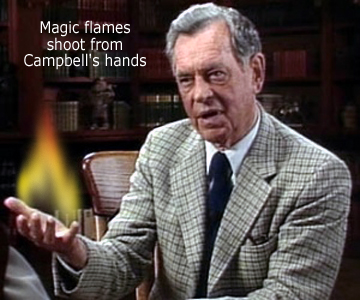 I already said that my experience reading Christopher Hitchens was one of realizing that I didn't disagree with it. It's not a book that changed me directly, but I probably wouldn't have picked it up if I didn't want to hear his thoughts, if I weren't -- somewhere inside me -- anxious to have someone convince me of what I already knew. Meanwhile, religious apologists, like my childhood hero C.S. Lewis, began sounding more and more like nonsense. When reading or listening to atheists, I had "yes, that's right" experiences. With religious people of any stripe, I had "no, that's wrong" experiences. Eventually this happened enough times that I had to give in to what was right and let go of the nonsense, no matter how deep it was embedded inside of me.
I already said that my experience reading Christopher Hitchens was one of realizing that I didn't disagree with it. It's not a book that changed me directly, but I probably wouldn't have picked it up if I didn't want to hear his thoughts, if I weren't -- somewhere inside me -- anxious to have someone convince me of what I already knew. Meanwhile, religious apologists, like my childhood hero C.S. Lewis, began sounding more and more like nonsense. When reading or listening to atheists, I had "yes, that's right" experiences. With religious people of any stripe, I had "no, that's wrong" experiences. Eventually this happened enough times that I had to give in to what was right and let go of the nonsense, no matter how deep it was embedded inside of me.Even now, I feel the need to seek out the words of atheists, to deprogram myself. This is why, after recognizing my atheism, I read Richard Dawkins's The God Delusion and Bertrand Russell's Why I Am Not a Christian. This is why I will read Daniel Dennett and Sam Harris and listen to atheist debates and lectures while doing the dishes. I won't have to do this forever. This is not like religion, where I need to be reminded of what I believe every week, but this is applying some medicine and bandages to my very serious wounds.
I'd like to make special mention of one book I read as part of this healing: The Portable Atheist: Essential Readings for the Nonbeliever, the Hitchens-edited compilation of two thousand years worth of atheistic writing from some of the brightest people who have ever lived (very good company). Sitting outside in the sun and wind, among the trees, book in hand, in this new world I was allowed to experience, one that a god did not create, going through each author one by one, was one of the greatest reading experiences of my life. It was a kind of purgatory for me, a burning away of those bad bits of goo left in my brain. As I encountered each author's thoughts, it was like walking through an ever-narrowing tunnel that forced me to get rid of my belongings and then my clothes, until I came out naked on the other side. It was such a soothing book. I've seldom been soothed by religion (you shouldn't have ever dared, for example, to try to comfort me by telling me that a loved one who had died was "in a better place"), but I was soothed by this book and by atheism itself.
And, yes, I do feel better. I daresay I'm in Heaven, or at least an inverted Hell. Religion will tell me that naturally I feel better, that I've shirked the responsibility not only of worshipping God but even of believing that he exists: laziness toward God feels great for a while, like laziness of any kind, but eventually the muscles get weak and life becomes unhappy. Either God will bring me back into the fold, they'll say, or I will die damned. So why not worship God just in case? And, they'll say, even if God doesn't exist, isn't it better to behave as if he does? Well, no. The preferable default is to behave as if he doesn't: it's the only way to make sure you're taking responsibility for yourself and those around you, knowing that God or a savior won't do it for you. Behaving as if he does requires not only a wasting of time and life (like waiting for Godot), but doing all sorts of miserable things in his just-in-case-he-exists name.
So I'll say this: if God is real (the monotheistic version anyway), I don't want anything to do with him. He's a complete asshole as depicted in all the reliable books (what do you expect from books written by slave-owning misogynists who lived thousands of years ago?), and if he isn't, it's because you're ignoring those books and making up a nicer version of this god, as I did. If God's son is any better, it's only because he had enough humanity in him to be so. One begins to understand the position of Satan in Paradise Lost when he says "Better to reign in Hell than to serve in Heaven." If separation from God is hell, then at least I have my liberty. I don't want to be that traitor from the war movie who sucks up to the enemy in order to stay alive or for some lofty office, knowing the dictator can -- as Jonathan Edwards puts it -- dangle me like a spider over the fire and drop me into Hell at any time. I'm as self-serving as the next guy, but there are certain things I simply won't do just to get into the snooty country club. So if Heaven exists, I don't care to kiss the ass required to go there.
You'll notice, I hope, that I haven't really brought up the usual culprit responsible for atheism: science. For me, science had little to do with it, though I can see why these things were part of others' narratives. You start realizing that this holy book claims, for example, that the earth is a few thousand years old and that science proves otherwise. You realize that "there's no convincing evidence that he exists" is more reasonable to say than "well, you can't prove that this thing that lives outside of time and space doesn't exist." Etc. The only reason I bring it up is to show that "science" isn't the only answer for what creates and sustains an atheist. I think it's a great and beautiful reason to be one, but I get a bit annoyed sometimes when it's heralded as the alternative to religion, as if you have to trade in your incense for a Bunsen burner. It also causes critics to -- wrongly, of course -- think of science (and atheism) itself as a religion. (South Park did an episode that claimed as much.) I don't turn to science any more or less than I did before, since I never doubted things that were proven scientifically (though I did believe that miracles existed). I have always been an artist, and my love is for myth, writing, music, paintings, film, sculpture, and the rest of it, and in these things is where the real God will always live for me.
 You'll also notice, I hope, that I'm not being overly snotty about religion or God (or I hope I'm not). One of the things that bugs me about atheists is their constant sarcastic attitude. Everything is a joke. Jokes are great, of course, and I always make jokes about religion (here and elsewhere), and I love religious jokes sometimes more than other kinds of jokes. But I'm talking about those that come from a place of snotty superiority. Either (I suspect) the snotty atheists were once believers and now that they believe otherwise, they're overcompensating (another thing I hope I'm not guilty of), or they never believed and are simply not able to understand why and how anyone could believe in a god. It is an odd thing to believe, I'll grant them that, but if you're born with it in your life, it's not odd at all. The feeling of God being real is very strong. It's overwhelming, so much so that -- for many -- the question of his existence never enters the mind at all. I hope I never forget where I came from and what I believed, and I hope I never turn into the kind of snot that I'm talking about. What I value more than my non-belief is religious liberty (love that first amendment!), and I would rather protect a religious group that I dislike (as long as it harms no one) than force atheism upon anyone.
You'll also notice, I hope, that I'm not being overly snotty about religion or God (or I hope I'm not). One of the things that bugs me about atheists is their constant sarcastic attitude. Everything is a joke. Jokes are great, of course, and I always make jokes about religion (here and elsewhere), and I love religious jokes sometimes more than other kinds of jokes. But I'm talking about those that come from a place of snotty superiority. Either (I suspect) the snotty atheists were once believers and now that they believe otherwise, they're overcompensating (another thing I hope I'm not guilty of), or they never believed and are simply not able to understand why and how anyone could believe in a god. It is an odd thing to believe, I'll grant them that, but if you're born with it in your life, it's not odd at all. The feeling of God being real is very strong. It's overwhelming, so much so that -- for many -- the question of his existence never enters the mind at all. I hope I never forget where I came from and what I believed, and I hope I never turn into the kind of snot that I'm talking about. What I value more than my non-belief is religious liberty (love that first amendment!), and I would rather protect a religious group that I dislike (as long as it harms no one) than force atheism upon anyone.The final way I want to qualify my atheism and distance myself from certain kinds of atheists is by saying that, as a result of the process of my conversion, I feel more godly now. While at any time in my past I might have always had a Bible nearby, now I look at the thirty-five books stacked in my room (which are my "reading pile," things I'm more or less currently reading or at least referring to) and thirteen of them are God-based. I can't live without this stuff. God and God books (including the Bible) mean so much more to me now that I don't have to read them through the tiny lens of a specific belief.
So, like the scientific atheist, I know why science is important. And, like the "belief in gods is silly" snotty atheist, I know why ridicule is important. But I also know that gods and myths are some of the most valuable tools we have for knowing ourselves. I can barely look at an image of the Hindu goddess Kali without feeling simultaneously thrilled and fearful. I almost always smile big when I see her, but I also sometimes get a stomach flutter, so it even brings a physical reaction. Have I ever "believed" in Kali as a literal thing? No. But I've considered writing poetry for her, which is something I never did for the god that I actually believed in all those years (unless forced) and whose image never gave me these feelings. As a nonbeliever, she is something I can believe in. The same is true of Yahweh and Jesus as well. I understand them more now.
Religious people believe that gods exist and non-religious people believe that they don't, but the best kind of atheist realizes that the question of belief is irrelevant. Did King Arthur exist or not? Who cares? What do his stories do for you? More simply: does Mary Poppins exist? Certainly not, but is anyone considered foolish for reading a book about her or for being charmed by her magic?
Once upon a time, I -- as many religious people like to cleverly say -- "didn't believe in atheists." I didn't see the point in going out of your way to not believe in something. I even thought they may have "protested too much," that they actually believed in God deep down and were fighting it (like a homophobe fighting his repressed sexuality). I was so desperate to have everyone on my side (a common trait among the religious) that I assumed some were believers when they certainly were not. "Oh, Kurt Vonnegut" (I declared, to give one example concerning a favorite author) "claims to not believe in God, but the things that he values and the things that he hates proves that he does." If you loved your family or art or morality or whatever, you were really loving God, the originator of these things. Gotcha!
So why do atheists go out of their way to not believe in something? Answer: because the worst of the believers (including the deadliest) go out of their way to force their beliefs on everyone else, and eventually one has to fight back. The bullying has to stop. If you're not an atheist and don't know what it's like to be one, I'll attempt an approximation. We all know the experience of not enjoying something that everyone else adores: a certain movie or celebrity or gadget or whatever. For me, it has always been football, which tends to insist itself upon me no matter how hard I try to escape it: my fault, I suppose, for being born an American male. But the bombardment of mass interest isn't the half of it. Where this approximation gets tricky is that you have to imagine that the thing that most everyone in the world loves but you doesn't actually exist! Or, if it does exist, it is invisible, and this invisible thing controls every element of society, loudly and violently.
This is why atheists feel the need to -- rather quietly and feebly, by comparison, you'll have to agree -- say "None for me, thanks."
When I was a Christian, I didn't talk about my beliefs much unless someone brought it up. I didn't like evangelists, missionaries, or any other kind of proselytizing from anyone. I thought my religion worked for me at the time, but I didn't imagine that it would necessarily work for anyone else, and -- even if it might -- my annoying them wouldn't bring them to it, so it was best to keep it to myself, though I was happy (thrilled) to talk about it to anyone interested. This is mostly how I hope to remain about my atheism, so consider this writing my very modest "coming out" party.
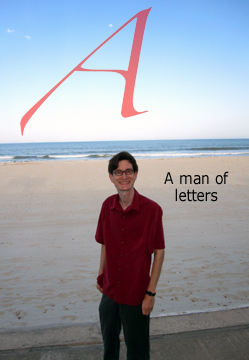 So I'm confessing atheism to you, the God Blog reader (probably strangers who came across this site looking for help on that William Blake essay), and not many others. Because I only want to tell this story to those who want to hear it. The only people I asked to read this writing (earlier versions of it), before publishing it, were very close friends, and that was done timidly and fearfully. (More math: it took me three years after realizing I was an atheist to show this to friends and one year after that to publish this here.) I don't plan on coming out to my old church members at the pulpit or to my family in the middle of Thanksgiving dinner. Atheists have proposed very good reasons for coming out to everyone they know (mirroring reasons why gay people should come out), but -- at the moment, for me -- I don't think it's worth it.
So I'm confessing atheism to you, the God Blog reader (probably strangers who came across this site looking for help on that William Blake essay), and not many others. Because I only want to tell this story to those who want to hear it. The only people I asked to read this writing (earlier versions of it), before publishing it, were very close friends, and that was done timidly and fearfully. (More math: it took me three years after realizing I was an atheist to show this to friends and one year after that to publish this here.) I don't plan on coming out to my old church members at the pulpit or to my family in the middle of Thanksgiving dinner. Atheists have proposed very good reasons for coming out to everyone they know (mirroring reasons why gay people should come out), but -- at the moment, for me -- I don't think it's worth it.But I'm not going to live a lie or hide either. If I end up attending a church service one day (a likelihood), I'm not going to pretend I'm still one of the flock (even at the risk of a spiritual intervention, otherwise known as an exorcism). I'm not going to thank God at the dinner table. (Last Christmas, I gave the "blessing" by thanking and loving everyone in the room and for being grateful for everything we had -- eyes open, no mention of God -- and it was the warmest and most honest I've felt in such a situation.) And I'm not going to have anything religious at my funeral, thank you very much, so I won't leave behind a lie either. My "legacy," whatever it ends up being, is somewhat important to me, and I don't want there to be doubts about me after I'm gone, so this is my public announcement. As I was with Christianity, I will be quiet most of the time and forthcoming when I need to be. No matter who it is: if asked, I'll tell.
I've been writing about God-related subjects on this blog for a few years, and I fear that this label will now pigeon-hole me, that I won't be able to write about God anymore without this giant "A" on my chest turning people off. I can only hope that my readers (whoever you are) realize that this has never been an atheist blog and it's not going to be one now. Nothing has changed since day one, so I hope my thoughts on God, myth, the holy, the mysterium tremendum, and the rest of it will be meaningful to you even after this confession.
What I've primarily wanted to accomplish here is to present the story of my path to atheism. Sometimes I think I've written too much, and sometimes I think I've written too little, but I hope I've communicated the essence of my journey. I'm not disappointed that what you've just read isn't more action-packed. Most atheism conversion stories aren't: lots of "and then I said 'oh' and that was that" stories. They're so different from religious conversion stories, with their flashes of light, rock-bottom drug narratives, angel visitations, prison time, miracles, shouting and crying, etc. So much showmanship is necessary for religious conversion stories to pack a punch, but atheist ones do so with a simple shrug of the shoulders and a getting-on with real life--which is what I intend to do.
2 comments:
Hey Rusty,
Thanks for sharing! I can definitely relate to your ideas, and I especially loved your Holden Caulfield analogy—it’s exactly how I feel about the matter. I really enjoyed your honesty and insight, and it’s nice to know that there are other mythology-loving atheists out there!
Thank you, Jenna!
Post a Comment